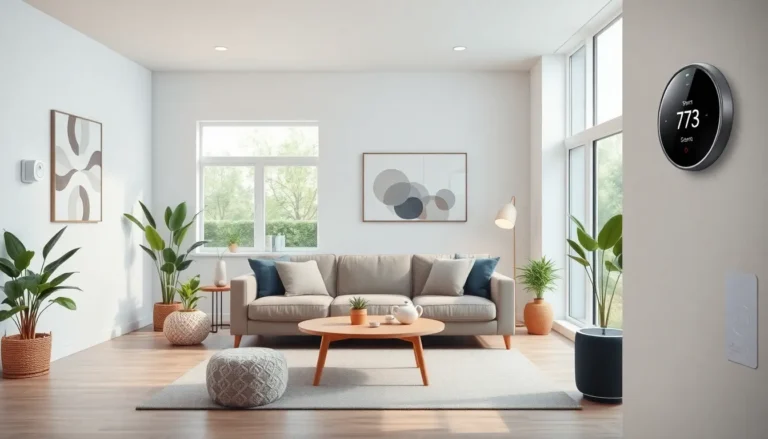Table of Contents
ToggleIn a world where everyone’s glued to their smartphones, why should healthcare be any different? Mobile apps for healthcare are shaking things up, making it easier than ever to manage health on the go. Gone are the days of waiting for hours in a stuffy waiting room—now, patients can consult doctors while lounging in their pajamas. Who knew healthcare could be so cozy?
These apps are not just about convenience; they’re about empowerment. From tracking vital signs to scheduling appointments, they put the power back in the hands of patients. Imagine having a personal health assistant that never takes a coffee break! As technology evolves, so does the way people approach their health, making mobile apps an essential part of modern healthcare. So, buckle up and get ready to explore how these digital wonders are transforming the healthcare landscape.
Overview of Mobile Apps for Healthcare
Mobile apps for healthcare play a crucial role in transforming patient experiences. These tools enhance communication between patients and healthcare providers, facilitating better management of medical conditions. Telemedicine apps offer real-time consultations, reducing the necessity for in-person visits.
Tracking health metrics becomes simpler with dedicated apps, as they allow patients to monitor vital signs like blood pressure and glucose levels. Appointment management apps eliminate scheduling conflicts by sending reminders and enabling easy rescheduling.
Medication management also receives significant attention from mobile applications, helping patients adhere to prescribed regimens. Some apps even offer educational resources, providing users with insights into their health conditions and treatment options.
Data security remains a top priority for developers, as sensitive health information must be protected. Regulations like HIPAA govern these applications, ensuring patient privacy is maintained.
Integration with electronic health records (EHRs) increases efficiency, allowing providers to access patient information swiftly. Furthermore, patient engagement improves through interactive features, encouraging users to take an active role in their healthcare journey.
Overall, mobile apps for healthcare empower patients, simplify processes, and enhance outcomes. As technology continues to evolve, the potential for these applications in healthcare grows, leading to innovative solutions tailored to individual needs.
Benefits of Mobile Apps in Healthcare

Mobile apps significantly offer advantages to healthcare by enhancing patient experiences and outcomes.
Enhancing Patient Engagement
Mobile apps boost patient engagement through various interactive features. Users can access educational materials about their conditions, promoting informed health decisions. Personalized health dashboards allow for real-time monitoring of important metrics, which fosters a proactive approach to health management. Regular notifications keep patients on track with medication schedules, thereby reducing non-adherence. These tools encourage patients to communicate with healthcare providers routinely, ensuring more effective care. Increased participation in their health may lead to better treatment outcomes.
Improving Accessibility to Healthcare Services
Mobile apps enhance accessibility to healthcare services for all patients. Telemedicine features enable individuals to consult healthcare professionals from the comfort of their homes, minimizing travel barriers. Users can schedule and manage appointments effortlessly, reducing waiting times and scheduling conflicts. Access to health records anytime allows for better-informed discussions during consultations. Integration with navigational support guides users to nearby clinics, making urgent care more achievable. Overall, mobile apps help bridge gaps in healthcare delivery, ensuring services are available when and where patients need them.
Types of Mobile Apps for Healthcare
Mobile apps in healthcare encompass various functions that cater to different needs, enhancing overall patient experience and management.
Telehealth and Virtual Consultations
Telehealth apps allow patients to consult healthcare professionals from home. These platforms enable video calls, secure messaging, and real-time interactions. Many users appreciate the convenience of scheduling appointments without leaving their homes. Often, telemedicine reduces wait times significantly compared to traditional visits. Patients access care for non-emergency issues quickly, which may increase adherence to treatment plans. These apps also enhance access for individuals in rural areas with limited healthcare resources. Several platforms comply with HIPAA regulations to ensure patient privacy during virtual consultations.
Health Tracking and Management Apps
Health tracking apps empower patients to monitor vital signs like heart rate, blood pressure, and glucose levels. Users record data daily, promoting awareness of their health status. Several applications provide personalized insights based on recorded metrics, which can lead to informed health decisions. These tools often integrate with wearable devices, enhancing tracking accuracy. Medication reminders within these apps help individuals adhere to their prescribed therapies. Many users find educational resources about their health conditions, adding value to their health management journey. Apps that centralize health data improve communication between patients and healthcare providers, facilitating better care coordination.
Challenges in Implementing Mobile Apps for Healthcare
Implementing mobile apps in healthcare presents significant challenges that require attention.
Data Security and Privacy Concerns
Data security stands as a critical issue in healthcare apps. Maintaining patient confidentiality is essential to comply with regulations like HIPAA. Security breaches can lead to unauthorized access to sensitive health information. App developers often struggle to incorporate robust security measures, which can deter providers from utilizing these technologies. Additionally, users may hesitate to share personal data due to privacy fears, influencing their willingness to adopt these apps. Secure authentication methods and encryption techniques enhance user trust and data protection, making them crucial for app success.
User Adoption and Engagement Issues
User adoption remains a notable hurdle for mobile healthcare apps. Many patients find it challenging to navigate new technologies, leading to frustration and disengagement. Training often lacks for both patients and healthcare providers, resulting in suboptimal use. To boost engagement, developers must prioritize user-friendly interfaces and provide comprehensive onboarding experiences. Encouraging regular interaction through notifications and personalized content can also foster sustained use. Addressing these issues is vital for ensuring that mobile apps achieve their intended impact on patient care.
Future Trends in Mobile Apps for Healthcare
The future of mobile apps in healthcare hints at significant advancements. Artificial intelligence (AI) plays a pivotal role, enabling personalized health recommendations based on user data. Chatbots equipped with AI will enhance patient communication, ensuring timely responses to queries.
Wearable technology increasingly integrates with mobile apps, promoting continuous health monitoring. These devices can track parameters like heart rate, sleep patterns, and activity levels, delivering real-time data to both patients and providers. This seamless integration supports proactive health management.
Telemedicine continues to evolve, expanding to include specialty care consultations. Patients in rural areas benefit from remote access to specialists, reducing travel time and improving treatment options. Continuous advancements in video conferencing technology enhance these virtual encounters.
Data analytics will drive improvements in patient outcomes. Tracking health trends at a population level allows healthcare providers to identify potential issues early. Predictive analytics can improve preventative care strategies, ultimately reducing hospitalization rates.
Security innovations will enhance data protection in mobile healthcare applications. Blockchain technology offers a transparent and secure method for managing health records, ensuring patient privacy. Compliance with regulations like HIPAA will remain a priority, maintaining trust between patients and providers.
User experience design will shape future app development. Simplified interfaces will make navigation easier for patients, encouraging widespread adoption. Developers will prioritize accessibility for all, including those with disabilities, ensuring inclusive healthcare solutions.
New features, like gamification, will likely increase patient engagement. Patients can earn rewards for achieving health goals, making health management more interactive. This approach may motivate users to adhere to treatment plans and engage with their healthcare providers.
Mobile apps are reshaping the healthcare landscape by enhancing accessibility and empowering patients to take control of their health. With features that streamline communication and facilitate real-time consultations, these tools are making healthcare more efficient and user-friendly.
As technology continues to evolve, the integration of AI and wearable devices will further refine patient experiences and outcomes. While challenges like data security and user adoption remain, the future of healthcare apps looks promising. By focusing on innovation and user engagement, the potential for improved patient care is immense. Embracing these advancements will be crucial for both patients and providers in navigating the ever-changing healthcare environment.







